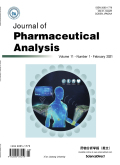Distinct molecular targets of ProEGCG from EGCG and superior inhibition of angiogenesis signaling pathways for treatment of endometriosis
Sze Wan Hung Yi Song Yao Wang Jacqueline Pui Wah Chung Tak Hang Chan Roman A.Zubarev Chi Chiu Wang Massimiliano Gaetani Yiran Li Zhouyurong Tan Xu Zheng Ruizhe Zhang Yang Ding Gene Chi Wai Man Tao Zhang
Distinct molecular targets of ProEGCG from EGCG and superior inhibition of angiogenesis signaling pathways for treatment of endometriosis
Distinct molecular targets of ProEGCG from EGCG and superior inhibition of angiogenesis signaling pathways for treatment of endometriosis
摘要
关键词
Molecular targets/ProEGCG/EGCG/Angiogenesis/Treatment/EndometriosisKey words
Molecular targets/ProEGCG/EGCG/Angiogenesis/Treatment/Endometriosis引用本文复制引用
Sze Wan Hung,Yi Song,Yao Wang,Jacqueline Pui Wah Chung,Tak Hang Chan,Roman A.Zubarev,Chi Chiu Wang,Massimiliano Gaetani,Yiran Li,Zhouyurong Tan,Xu Zheng,Ruizhe Zhang,Yang Ding,Gene Chi Wai Man,Tao Zhang..Distinct molecular targets of ProEGCG from EGCG and superior inhibition of angiogenesis signaling pathways for treatment of endometriosis[J].药物分析学报(英文),2024,14(1):100-114,15.基金项目
This work was supported by the GRF RGC & CRF,Hong Kong(Grant Nos.:475012 and C5045-20 EF) (Grant Nos.:475012 and C5045-20 EF)
HMRF,Hong Kong(Grant No.:03141386) (Grant No.:03141386)
ITF,Hong Kong(Grant No.:ITS/209/12) (Grant No.:ITS/209/12)
UGC Direct Grant 2011,2012,2021.032 ()
HKOG Trust Fund 2011,2014,2019 ()
and the National Natural Science Foundation of China(Grant Nos.:81974225 and 82201823).The Chemical proteomics core facility at Biomedicum(MBB,Karolinska Institute),also the Unit of SciLifeLab and part of the Swedish National Infrastructure for Biological Mass Spectrometry(BioMS),provided full support in the experimental design and the performance of the proteomics analysis using the Proteome Integral Solubility Alteration(PISA)assay for target dis-covery,with relative data analysis. (Grant Nos.:81974225 and 82201823)

